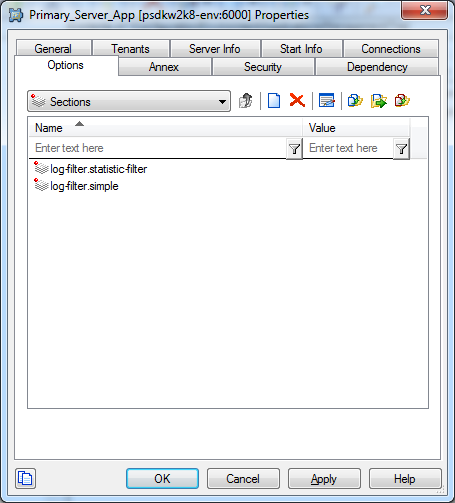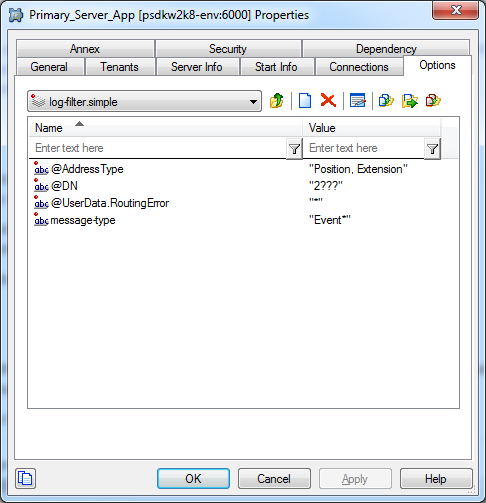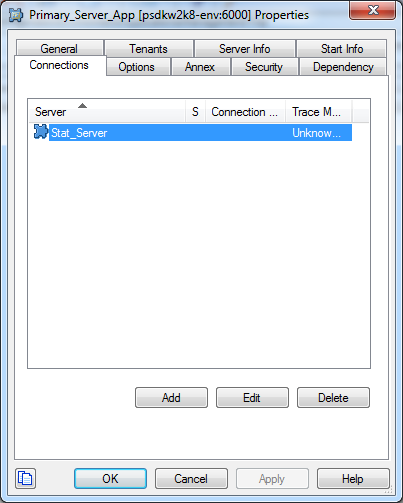Contents
Log Filtering
Introduction
Debug Log Level in Platform SDK protocol may affect Application performance due to huge log information output.
The aim is to introduce the ability to dynamically configure the verbosity of Platform SDK message logging. This way, production applications will be able to provide appropriate traces for troubleshooting without hurting performance with overly verbose logs.
This feature should provide ability to set message filtering, for defining which messages should be logged and which should not.
Message filter can be executed only when Debug log level is enabled.
Create and assign message filter directly
Use setLogMessageFilter() to assign custom log filter implementation for the protocol objects:
protocol.setLogMessageFilter(new MessageFilter(){
public boolean isMessageAccepted(Message message) {
if(message.messageId()==123) {
return true;
}
else {
return false;
}
}
});This filter allows to log messages with ID equals to 123.
It is possible to assign default filter implementation, see described below.
Use Application Template to setup filters
Application Template provides default filter implementations. This filter can read configuration and handle updates from Configuration Server.
Default filter implementation should be wired with a client protocol using FilterConfigurationHelper.bind() method.
User needs to provide application name where filter configuration was defined and Config Service (to read application):
import com.genesyslab.platform.applicationblocks.com.ConfService;
import com.genesyslab.platform.applicationblocks.com.objects.CfgApplication;
import com.genesyslab.platform.applicationblocks.com.queries.CfgApplicationQuery;
import com.genesyslab.platform.apptemplate.configuration.ClientConfigurationHelper;
import com.genesyslab.platform.apptemplate.configuration.GCOMApplicationConfiguration;
import com.genesyslab.platform.apptemplate.configuration.IGApplicationConfiguration.IGAppConnConfiguration;
import com.genesyslab.platform.configuration.protocol.types.CfgAppType;
import com.genesyslab.platform.commons.protocol.Endpoint;
import com.genesyslab.platform.reporting.protocol.StatServerProtocol;
import com.genesyslab.platform.apptemplate.filtering.FilterConfigurationHelper;
public class MyApp {
public void init() {
...
//read application settings and create protocol
String appName = "my-app-name";
CfgApplication cfgApplication = confService.retrieveObject(
CfgApplication.class, new CfgApplicationQuery(appName));
GCOMApplicationConfiguration appConfiguration =
new GCOMApplicationConfiguration(cfgApplication);
IGAppConnConfiguration connConfig = appConfiguration.getAppServer(CfgAppType.CFGStatServer);
Endpoint endpoint= ClientConfigurationHelper.createEndpoint(
appConfiguration, connConfig,
connConfig.getTargetServerConfiguration());
StatServerProtocol statProtocol = new StatServerProtocol(endpoint);
statProtocol.setClientName(clientName);
//assign message filters to the protocol
FilterConfigurationHelper.bind(statProtocol, appConfiguration, confService);
statProtocol.open();
}
}Helper method FilterConfigurationHelper.bind() reads application configuration, instantiates filter objects, assigns them to protocol, subscribe for Configuration Server notifications, registers handlers for protocol events and so on. When filters are not required anymore, release filtering infrastructure:
FilterConfigurationHelper.unbind(statProtocol,confService);Use Configuration Manager to define filters, as described below.
Define filter in Configuration Manager
Filters are defined in the application "options" tab in configuration manager.
Filter name must be preceded with "log-filter." prefix.
For example: "log-filter.my-filter"
Filter names cannot start with "-", "!", or space symbols. Names such as "log-filter.-somefilter" are not allowed.
Filter options are specified under the "log-filter.name" section.
Example: Define filter for T-Server channel which will show only incoming events for DNs that are types of Positions or Extension and match "2???". Events should have user data with key "ROUTING_ERROR". Here is how configuration can be done:
Filter options can represent one or more message attribute conditions.
log-filter.simple
message-type = Event*
@DN = 2???
@AddressType = Position, Extension
@UserData.RoutingError = *
After the filter is defined, assign it to one or more protocols on the application’s "Connection" tab.
In Application Parameters it is possible to specify one or more filters for a protocol:
log-filter = simple, error-filter, other-filter
See Filter Chain for details.
Filter Syntax
It is possible to specify one or more conditions to filter messages by their names or (and) attribute values.
List of elementary conditions evaluate with "AND" operation.
Message Type Conditions
Evaluates message name or message id.
message-type = constant value
Example:
| Option | Description |
|---|---|
| message-type = EventInfo | Filter accepting only EventInfo message |
| message-type = 125,126,127 | Filter accepting messages with id 125,126 and 127. |
| message-type = Event* | Filter accepting all Events |
Attribute conditions
Evaluates message attribute value.
@attribute-name = constant value
Example:
| Option | Description |
|---|---|
| @ReferenceId = 50 | Matches ReferenceId attribute value with 50. |
| @DN = 2??? | Matches DN attribute value with 4-character string starting from "2". Attribute values like "2999" or "2ef7" will be accepted. Value "299999" will not be accepted. |
| @UserData.CustomerID = 87624FAC | Matches "CustomerID" key of the complex "UserData" attribute with "87624FAC" value. |
| @StatisticObject.ObjectId = place* | Matches statistic object which name start from "place" |
Attribute names
Attribute name is specified after the "@" symbol. Attribute names should match getter name of the corresponding message class. To find out attribute name, see API reference guide for the corresponding message.
For example:
message.getStatisticObject().getObjectType().equals(...);
equals to filter condition
"@StatisticObject.ObjectType = ... "
To access sub element of the complex attribute (KeyValueCollection, CompoundValue), specify the name of inner element. Names should be delimited with "." symbol:
@attribute-name.element-1.element-n.
Supported attribute types
Currently supported message attribute types:
- string,
- int,
- enum,
- KeyValueCollection,
- CompoundValue (complex attributes like StatisticObject.)
If attribute has complex type, it is possible to specify matching condition only for one of its inner elements of a simple type: string, integer or enum. For example, here is how to specify condition for "TenantName" element of the complex "StatisticObject" attribute:
@StatisticObject.TenantName = 101
Constant values
Condition can have one or more constant values, delimited with ",". If one of the specified constants
matching attribute value (or message name), condition will return true.
Constant values supports wildcards:
| Symbol | Description |
|---|---|
| * | Any sequence of symbols.
For example, "Event*" matching any message name, starting from Event |
| ? | Any symbol at specified position.
For example, 555?5 will match 555A5 or 55505 strings. |
| \ | Escape symbol.
For example, 555\?5 will match only 555?5 string. |
Constant examples:
@AgentPlace = place1000
@AgentPlace = place*
@AgentPlace = place100??
@AgentPlace = place110, place120, place2??
Inverted conditions
It is possible to invert attribute condition or message condition result by specifying "#not" prefix:
#not message-type = RequestAgentLogin
or
#not @DN = 10
Empty filters
Filter with empty options will return negative evaluation result. It can be used to deny all messages for a protocol object.
Stateful filters
Sometimes user doesn't know what attribute value should be specified in a filter condition. For example, in Statistic protocol, the ReferenceId attribute (which uniquely identifies EventInfo message with statistic data), initializing at a runtime, during statistic opening. To find out ReferenceId value, user needs to search corresponding RequestOpenStatistic in logs.
Use case: trace EventInfo messages with any statistic for "place100".
Default log filter implementation allows to save attribute value from one message and re-use it to trace other messages.
Configuration sample:
log-filter.stat-filter
message-type = RequestOpenStatistic
@StatisticObject.ObjectId = place100
trace-on-attribute = ReferenceId
trace-until-message-type = EventStatisticClosed
When filter meets condition ( "RequestOpenStatistic" message with "place100" statistic object), the ReferenceId is added to the list of saved values.
When filter receives message ("EventInfo" in statistics protocol) with ReferenceId matching to any of the saved values, it allows to log the messages. More then one statistics for "place100" could be opened, so it is possible to store several ReferenceId values.
When filter receives "EventStatisticClosed" with ReferenceId matching to any of the previously saved values, this value is removed from the list. When values list is empty, no messages could be logged.
Note 1: Filters processing messages only when debug log level is enabled. In order to save ReferenceId value, debug log level should be enabled before RequestOpenStatistic is sent to server.
Note 2: Saved values are cleared upon protocol close.
Note 3: Number of saved values is limited to 1024 to prevent high memory consumption upon incorrect filter conditions. It can be changed with system property "com.genesyslab.platform.filtering.valuelist.capacity". Changing to greater value is not recommended.
Filter Chain
List of filters on the "Connection tab" represent a filter chain. By default, filter chain evaluates filter results as "OR" expression. If one of the filter accept message message will be logged and other filters will not be evaluated. Filters can be of two types: "accept" and "deny" filters
Use cases
| Filter type | Use case |
|---|---|
| accept
(default) |
User exactly knows criteria by which messages should be logged. For example, log all Events and Requests with "DN" attribute "2000". |
| deny | User see a lot of unneeded messages in log with common data. User can specify "deny" filter to truncate those messages. |
Filter chain behavior
| Filter type | Message evaluation result | Filter chain behavior |
|---|---|---|
| accept (default) | TRUE\FALSE | If TRUE - allow log, do not execute other filters. Otherwise, execute next filter. Deny log if last filter returned FALSE |
| deny | TRUE\FALSE | If TRUE - deny log, do not execute other filters. Otherwise, execute next filter. Allow log if last filter returned FALSE |
Syntax
Filter name, prefixed with "-" means "deny" filter. Names without prefix mean "accept" filter.
Example:
"log-filter = -filter"
"log-filter = f1, f2, -f3".
Filter result negation
Optionally, it is possible to invert message evaluation result for a filter with "!" symbol.
Example:
"log-filter = !filter"
"log-filter = f1, !f2, f3"
"log-filter = f1, -f2, -!f3".
Special filters
While delivering message from TCP connection to the client's receiver (or in opposite direction), Platform SDK can trace message on the different points of its way:
2014-07-31 15:07:38,168 [New I/O worker #1] DEBUG otocolMessagePackagerImpl - New message #2 .... 2014-07-31 15:07:38,168 [New I/O worker #1] DEBUG ns.protocol.DuplexChannel - Complete message handling: 2
It is possible to disable such log entries with special filter "skip-trace-msg". This filter can be specified as a stand-alone filter, or can be used together with other filters in a filter chain:
Example:
log-filter = skip-trace-msg log-filter = filter-1, filter-2, filter-n, skip-trace-msg




